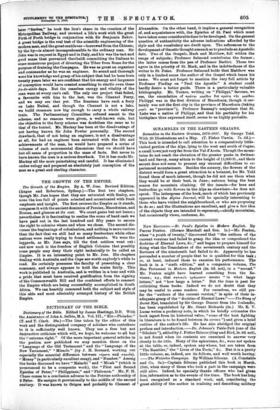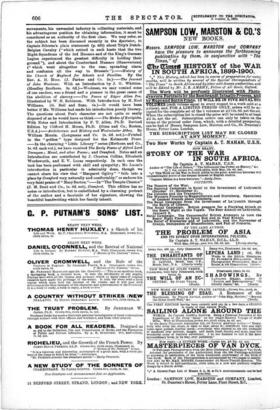NEW EDITIONS.—St. Paul's Epistles in Modern English. By Farrar Fenton.
(Horace Marshall and Son. ls.)—Mr. Fenton, when "a youth of twenty," discovered that "the authors of the current versions had failed to grasp the idea or comprehend the doctrine of Eternal Laws, &c.," and began to prepare himself for doing what the Translators of the seventeenth century and the Revisers of the nineteenth had failed to do. Apparently he has persuaded a number of people that he is qualified for this tag; or, at least, induced them to examine his performance. The book is in a "sixth edition." and a companion volume, The New Testament in Modern English (28. 6d. net), in a "second." Mr. Fenton might have learned something from the Re. visers ; e.g., that anxiss7s 7pcippanv means " in what large letters," not "how large a letter." But the time is past for criticising these books. Indeed we do not doubt that they may be useful to some readers. For ourselves, we still pre- fer the "authors of the current version," in spite of their in- adequate grasp of the "doctrine of Eternal Laws."— The Story of Burnt Njal, translated by Sir George Dasent from the Icelandic, has been republished by Mr. Grant Richards (6s.) Mr. E. V. Lucas writes a prefatory note, in which he briefly estimates the book (apart from its historical value, "some of the beat fighting in literature is to be found between its covers ") and gives a brief outline of the author's life. He has also abridged the original preface and introduction.—Dr. Johnson's Table-Talk (one of the "Bibelots "), edited by J. Potter Briscoe (Gay and Bird, 2s. 6d. net), is not found when its contents are examined to answer very closely to its title. Many of the aphorisms, Isc., were not spoken at the table, or, indeed, spoken any where, but are taken from "The Rambler," the "Lives of the Poets," Ssc. But it is a pretty little volume, as, indeed, are its fellows, and well worth having. —The Waterloo Campaign. By William Siborne. (A. Constable and Co. 6s.)—Captain Siborne published this book in March, 1814, when many of those who took a part in the campaign were still alive. Indeed, he specially thanks officers who had given him information as to the events of the time. The book has long been recognised as a standard work, and, considering the great ability of the author in realising and describing military movements, his unwearied industry in collecting materials, and his advantageous position for obtaining information, it must be considered as an authority of the first class. We may refer, as the subject has been discussed recently in the Spectator, to Captain Siborne's plain statement (p. 463) about Trip's Dutch. Belgian Cavalry (" which retired in such haste that the two Right Squadrons of the 3rd Hussars and of the King's German Legion experienced the greatest difficulty in holding their ground "), and about the Cumberland Hussars (Hauoverians) (" which went altogether to the rear, spreading alarm and confusion all the way to Brussels ").—History of the Church of England for Schools and Families. By the Rev. A. H. Hore. (J. Parker and Co. 5s.)—The Journal of John Woolman. With an Introduction by J. G. Whittier. (Headley Brothers. 3s. 6d.)—Woolraan, we may remind some of our readers, was a friend and a pioneer in the great cause of the abolition of slavery.—The Poems of Edgar Allan Poe. Illustrated by W. H. Robinson. With Introduction by H. Noel Williams. (G. Bell and Sons. 6s.)—It would have been better if Mr. Williams had made his introduction purely literary. The questions about Poe's character are not quite so easily disposed of as he would have us think.—The Medea of Euripides. With Notes and Introduction by F. T. Allen, Ph.D. Revised Edition by Clifford H. Moore, Ph.D. (Ginn and Co., Boston, U.S.A.)—Architecture and History and Westminster Abbey. By William Morris. (Longmans and Co. 2s. 6d. net.)—Printed in the " golden " type designed for the Kelrascott Press. —In the charming "Little Library" series (Methuen and Co., Is. 6d. each vol.), we have received The Early Poems of Alfred Lord Tennyson ; Maud, and other Poems ; and Cranford. Notes and an Introduction are contributed by J. Churton Collins, Elizabeth Wordsworth, and E. V. Lucas respectively. In each case the task has been performed with skill and sympathy ; Mr. Lucas's introduction in particular is admirably done, though we cannot share his view that "Margaret Ogilvy" "falls into a place by Cranford very naturally and comfortably," or endorse his very faint praise of " Mary Barton."—In "The Temple Classics" (J. M. Dent and Co., Is. 6d. net), Cranford. This edition has no notes or introduction, but is embellished by a charming portrait of the author and a facsimile of her signature, showing the beautiful handwriting which her family inherit.























































 Previous page
Previous page